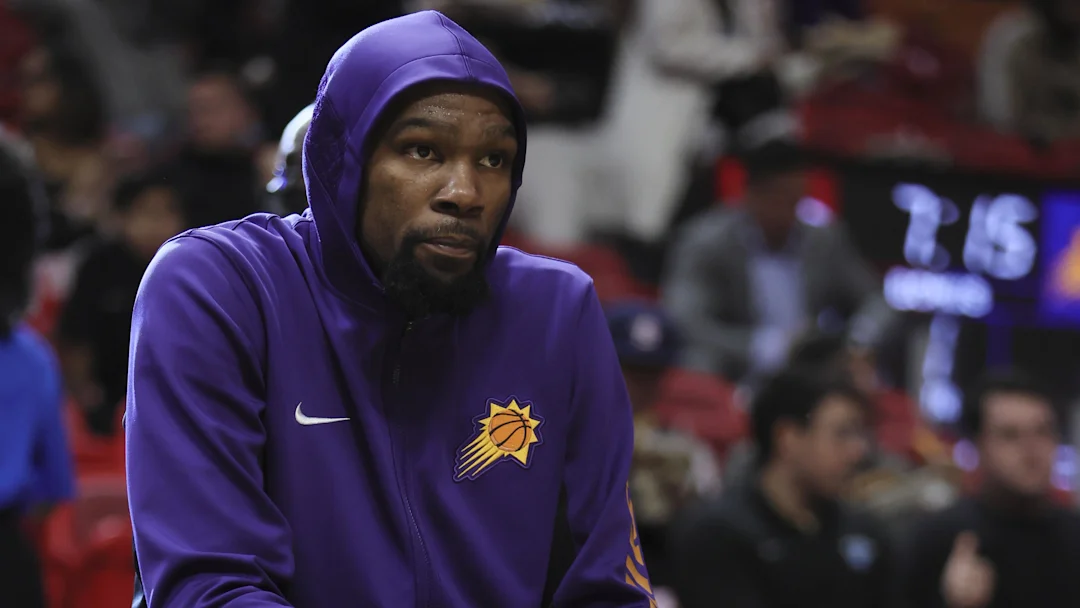Miami Heat head coach Erik Spoelstra has never been one to mince words when it comes to speaking his mind about the game of basketball and the players who have shaped it. Known for his discipline, tactical brilliance, and ability to lead with poise, Spoelstra recently opened up about one of the most enigmatic and impactful players of this generation: Kevin Durant. And when he spoke, it wasn’t with the casual flattery one might expect in today’s era of carefully curated public relations soundbites. It was raw. It was real. It was deeply respectful. Spoelstra made it clear — Kevin Durant is a generational force, and his impact on the league transcends wins, losses, and even championships.
Speaking during a recent interview that circulated rapidly among NBA circles, Spoelstra was asked to share his perspective on Durant — not just as a player, but as a competitor, a symbol of the modern NBA, and a man who has remained true to his identity amidst endless scrutiny. Spoelstra didn’t hesitate. “He’s one of the most unique scorers this league has ever seen,” Spoelstra began, his voice laced with a mixture of awe and appreciation. “You don’t teach what Kevin Durant does. That’s not something you put on a whiteboard. That’s artistry. That’s talent fused with an incredible work ethic. And above all, that’s a competitor.”
Spoelstra’s Heat teams have faced Durant numerous times over the years — from intense regular-season matchups to unforgettable postseason duels. Whether Durant was wearing Thunder blue, Warriors gold, or Suns purple, Spoelstra had to game plan for a 7-foot offensive juggernaut who could shoot over any defender, pass with precision, and lock in defensively when it mattered most. And despite all the scheming, the traps, the adjustments, and the double teams, Spoelstra readily admitted one thing: you don’t “stop” Kevin Durant. You hope to contain him. You pray he misses. And you live with the results.
What makes Spoelstra’s praise particularly compelling is that it comes from a coach who has built his career on defensive grit and discipline. The Heat culture — often referenced with both admiration and eye rolls — is synonymous with accountability, sacrifice, and toughness. Spoelstra, a film-room graduate turned two-time NBA champion coach, has had to contend with some of the greatest players in NBA history. Yet when he speaks about Durant, there’s a different tone. A tone of reverence. Not just for Durant’s skill, but for his mindset.
“He’s wired differently,” Spoelstra said. “KD doesn’t play for approval. He plays because he loves the game. And that love shows up in the way he carries himself, the way he responds to challenges, the way he still finds motivation after everything he’s accomplished.” Spoelstra’s words underscore something few outside of the NBA’s inner sanctum truly grasp — that Durant is as much a student of the game as he is a master of it. His basketball IQ, Spoelstra notes, is off the charts. He sees the game two or three steps ahead, not just when it comes to scoring, but in how he positions himself, how he spaces the floor, and how he manipulates defenses into uncomfortable situations.
One might assume that with such high praise, Spoelstra harbors a desire to coach Durant someday. After all, Durant is still capable of elite-level play, and Miami has long been a destination for stars who want to buy into a winning culture. But Spoelstra stopped short of any such speculation, instead choosing to focus on the mutual respect they’ve cultivated through years of hard-fought battles.
“I think the greatest compliment I can give KD is that we prepare for him the same way we prepare for the very best,” Spoelstra said. “And even when we do everything right, he still finds a way to beat you. That kind of greatness — you don’t see it every day. That’s rare air.”
The respect between Spoelstra and Durant isn’t one-sided either. Durant has publicly spoken about his admiration for the Heat and their identity under Spoelstra. He’s acknowledged the difficulty of playing against Miami teams, highlighting their physicality, strategic execution, and mental toughness. He’s also recognized Spoelstra as one of the best minds in the game — a coach who consistently gets the most out of his players, regardless of roster changes or injuries.
Their interactions during games tell the same story. Rarely does Durant react emotionally to coaching on the opposing sideline. But against Spoelstra, there’s a subtle difference — a nod after a smart adjustment, a smirk after being defended well, a quiet acknowledgment of basketball chess at its highest level. It’s not animosity. It’s respect. It’s two minds that recognize each other in a world of chaos and competition.
Durant’s career has taken many twists and turns. From being a beloved prodigy in Oklahoma City to a polarizing figure in Golden State, to a reflective superstar in Brooklyn and now Phoenix, he’s endured more scrutiny than most athletes can imagine. His decisions — whether applauded or criticized — have always stemmed from a place of personal agency. He’s chased greatness, not validation. And in Spoelstra’s eyes, that’s something to admire, not diminish.
“He’s handled everything — the highs, the lows, the noise — with a quiet strength,” Spoelstra said. “A lot of guys fold under that kind of pressure. KD just keeps hooping. That says a lot about who he is, not just as a player, but as a man.”
That last line speaks volumes. Because in today’s NBA, where narratives are often driven by social media and hot takes, genuine appreciation between competitors is becoming increasingly rare. Spoelstra’s comments weren’t about boosting Durant’s brand or appeasing fans. They were about truth. About giving credit where it’s due. About recognizing a peer whose excellence demands acknowledgment.



